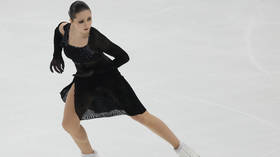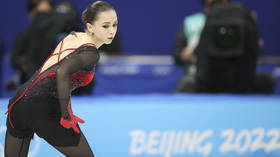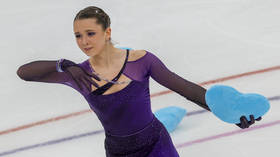Russian anti-doping chief responds to outside pressure in Valieva case

Russian Anti-Doping Agency (RUSADA) president Veronika Loginova has reiterated that the organization is under no obligation to disclose the details of the investigation into figure skater Kamila Valieva.
RUSADA has faced calls in recent days from the World Anti-Doping Agency (WADA) and the head of the International Olympic Committee (IOC), Thomas Bach, to make information publicly available regarding Valieva’s case.
The figure skater, then aged 15, was at the center of a scandal at the Beijing Winter Olympics in February when it emerged that she had tested positive for banned heart drug trimetazidine, based on a sample taken around six weeks prior to the Games.
RUSADA has been tasked with investigating the circumstances of the positive test, and Loginova said last month that the case would move to a disciplinary anti-doping committee (DAC) hearing, likely to be held in October.
The organization stressed last week, however, that it intended to keep details of the case private, citing Valieva’s status as a “protected person” due to her age.
Following outside pressure, Loginova doubled down on that position in a press release on Thursday.
“The process of processing the results in this case, as well as in all cases that are under the jurisdiction of RUSADA, is carried out in strict compliance with Russian and international anti-doping standards. There were no violations of the established procedures,” read a statement shared by RIA Novosti.
“Due to the dissemination of false information in the press and a large number of requests media for comment, on October 21, RUSADA issued an official statement that it did not intend to voice details on this case and answer questions about the hearing.
“In accordance with the standards, the process was supposed to be confidential from the very beginning. The decision to publicly disclose the data on the case after the final decision is made remains with RUSADA,” added Loginova.
WADA president Witold Banka issued a social media warning on Thursday, stating that the organization would take up Valieva’s case with the Court of Arbitration for Sport (CAS) in Switzerland “unless the matter is resolved promptly.”
Valieva had already helped the Russian Olympic Committee (ROC) to win gold in the figure skating team event in Beijing before her positive test was reported. She was cleared by an emergency CAS panel to compete in the individual event, but finished a disappointing fourth despite being the strong favorite for gold.
Valieva’s team, which includes hugely successful coach Eteri Tutberidze, have denied any wrongdoing. It was suggested at their CAS hearing in February that the positive sample – which was taken at the Russian championships at the end of December – may have come from contamination with heart medication her grandfather was taking.
Russian officials have also stated that Valieva passed numerous other doping tests, while questions have been asked regarding the length of time it took the WADA-accredited laboratory in Stockholm to report her positive sample.
Valieva and her compatriots are currently banned from tournaments organized by the International Skating Union (ISU) because of the conflict in Ukraine, although they are competing at a series of alternative Grand Prix competitions in their homeland.
Valieva won the first of those in Moscow last weekend, and her new routines include strong references to the scandal which overshadowed her time at the Beijing Olympics.














